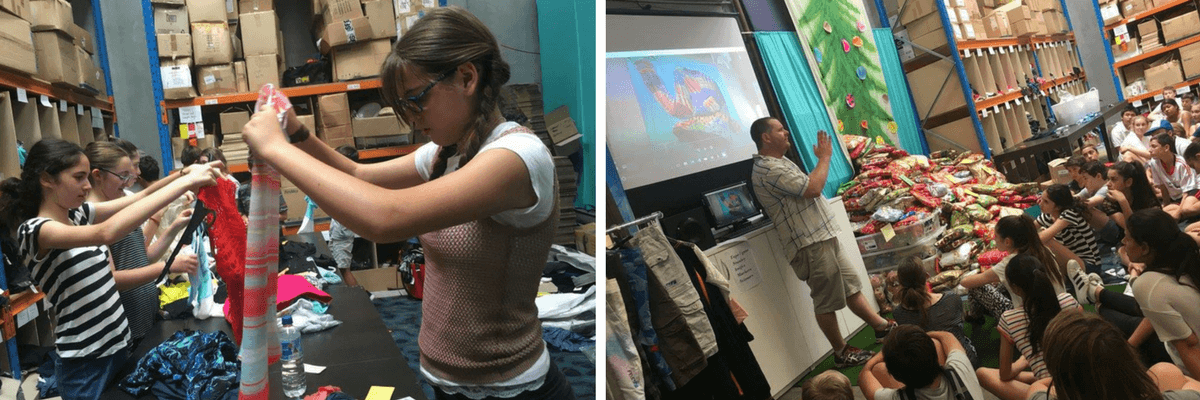Why is volunteering a valuable activity to do as a family?
Volunteering as a family is one of the most wonderful things a family can do. Everyone is united, working toward a greater cause – doing something to make a difference for someone else and supporting something they believe in. Parents have the opportunity to role model giving for their children, and this is invaluable. Our children are carefully watching everything we do, and so when we as parents show our children that we care about others, and that we can make a difference – our children are absorbing a very important message about connecting with and building community.
What kind of volunteering activities do you recommend for families with young children?
For children younger than 5 we recommend that parents take them along to do some bush regeneration in their local area – this is usually a great, whole family event and a great way to meet other local families. Parents should contact their local council and get on their mail list to find out about environmental/bush regeneration programs. Apart from helping build and protect our environment, the kids are also helping themselves. Sadly these days as a result of time spent on their electronic devices, kids spend less time outdoors than they did in the past. Getting kids out into the fresh air, doing something for the community in which they live, is one of the best things that parents can do with young children.
Each school holidays we offer families the opportunity to make and serve meals to clients at the Asylum Seekers Centre. Children as young as 5 can participate, assisting with easy cooking tasks in their own home, and then setting the table and chatting with refugee and asylum seekers at the ASC when the family serves the meals. The joy that young kids can bring is immeasurable. And the great feeling the kids have as a result of helping others is also immeasurable. This is the ‘double impact’ of all our work at Kids Giving Back, as we work to create the Next Generation of Generosity.
As parents it’s important to find where your own passions lie – and where age appropriate to involve your children in your own volunteering. e.g. if you decide to to Meals on Wheels, or to volunteer at an aged care facility, take your children with you (provided you have permission from the facility). Passion is contagious – once your children feel your passion for what you’re doing you’re igniting the fire within them.
At Kids Giving Back we maintain that by involving children with volunteering from an early age it becomes a part of their DNA. Time and again we meet adults who are volunteering, and when we ask them when and how they got involved, the answer generally goes back to their childhood.
Aside from participating in volunteer work, what other ways can parents instil the value of volunteering in their children?
Children generally absorb their parents’ values. The conversations that take place at home, between parents and also between parents and children, all make an impact on our kids. If we raise our kids in a loving, nurturing environment where the empathy and caring go beyond just the immediate family – our children are raised caring for others. If we make our children aware of communities around us – people in need, homeless, elderly, those with disabilities, refugees and asylum seekers – our children become aware of the greater world they are a part of. Our Kids Giving Back philosophy embraces breaking down the difference between ‘us’ and ‘them’.
In Australia, what are the greatest areas of need for volunteers?
The greatest need anywhere in Australia is the need we can respond to through giving our time to make a difference. We constantly get enquiries from all around Australia and there is need all around us – it’s up to each of us to decide which communities we’d like to connect with, to make a difference. For many communities and charities just knowing that someone out there cares enough to make a difference is hugely affirming. The moment someone knows that someone else cares for them, is already a huge leap forward to bringing joy to that person.
Carole Schlessinger and Ruth Tofler-Riesel are co-directors of KIDS GIVING BACK. We both have young children and believe that one is never too young to help others. Volunteering with our own children, both locally as well as internationally, came out of a desire to enable our children to give to others not as privileged as themselves. We wanted to instill in them experiences which would teach them compassion from a young age.
We started Kids Giving Back because we want to create the next “Generation of Generosity”, to make giving back to community part of a child’s DNA. We want to create opportunities for kids and their families to embrace real life experiences, away from the virtual world that kids live in today, and to spend quality time, either with friends or as a family, giving back. Our approach embraces kids walking hand in hand with other communities, each inspiring and empowering one another. It doesn’t take long to understand that when our children are deeply involved with giving to others, they inevitably gain as much as they give.
Our philosophy
We strongly believe that when young people volunteer they develop respect, resilience, and leadership skills, as well as the ability and opportunity to positively engage in the wider community. Our philosophy embraces volunteering as a two-way street, giving children and their families an opportunity to change lives, including their own.
Our goal is to develop long term, ongoing relationships with community groups/ organisations in which we place school age kids, and to ensure that each organisation truly benefits from these young, enthusiastic volunteers.
Our mission is to instill in young people and their family unit the beauty of giving to others, not just of material things but of time through real life experiences. We believe that when kids (together with their families and school peers) volunteer, we are developing our next generation of leaders and creating a culture of generosity and civic responsibility.






